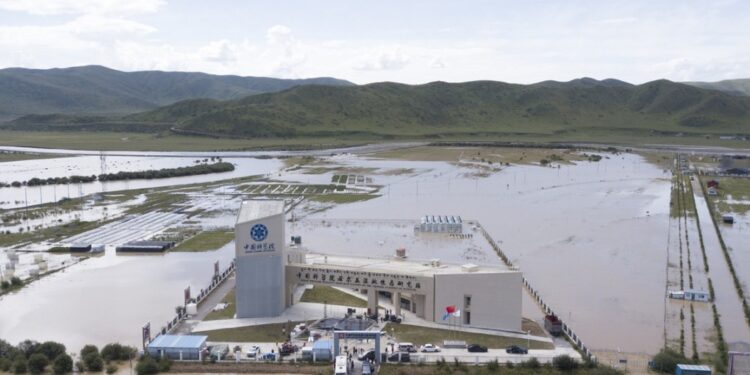– What are the impacts of peatland degradation on water regulation?
The Hidden Potential of Peatlands: A World of Research Opportunities Awaits
Peatlands, also known as peat bogs or mires, are unique ecosystems that cover about 3% of the Earth’s land area. These wetland areas are characterized by the accumulation of organic materials, mainly decomposed plant material, with limited oxygen availability. Peatlands are found in almost every country and are a crucial component of the global carbon cycle, playing a significant role in climate change mitigation.
Research on peatlands has gained momentum in recent years, as scientists and environmentalists recognize their value in carbon sequestration, biodiversity conservation, and water regulation. Uncovering the hidden potential of peatlands presents a wealth of research opportunities that can significantly contribute to the understanding and sustainable management of these critical ecosystems.
Keywords: peatlands, research opportunities, carbon sequestration, biodiversity conservation, sustainable management
Carbon Sequestration in Peatlands
Peatlands store vast amounts of carbon, making them one of the most significant terrestrial carbon reservoirs on the planet. The accumulation of organic matter in waterlogged conditions prevents its full decomposition, leading to the retention of carbon over thousands of years. Understanding the processes that regulate carbon storage in peatlands is essential for developing effective climate change mitigation strategies.
- Research opportunity: Investigating the factors influencing carbon sequestration in peatlands, such as hydrology, vegetation composition, and nutrient availability.
Biodiversity Conservation in Peatlands
Peatlands support a diverse range of plant and animal species, many of which are specialized to thrive in these unique habitats. From rare orchids to insect-eating plants, peatlands harbor a wealth of biodiversity that is often overlooked. Studying the biodiversity of peatlands can provide insights into the ecological functions of these ecosystems and support conservation efforts.
- Research opportunity: Assessing the biodiversity of peatlands and its response to environmental changes, including land-use practices and climate variability.
Water Regulation in Peatlands
Peatlands play a crucial role in regulating water flow and quality. They act as natural sponges, absorbing and storing water during heavy rainfall and releasing it slowly during dry periods. Research on the hydrological functions of peatlands is essential for understanding their role in flood prevention, water purification, and groundwater recharge.
- Research opportunity: Investigating the impacts of peatland degradation on water regulation and exploring restoration measures to enhance their hydrological functions.
Practical Tips for Peatland Research
Conducting research on peatlands presents unique challenges and opportunities. Here are some practical tips for researchers interested in uncovering the hidden potential of peatlands:
- Collaborate with local communities and indigenous groups to gain insights into traditional knowledge and land-use practices related to peatlands.
- Use interdisciplinary approaches to address complex issues related to peatland management, involving ecologists, hydrologists, social scientists, and policymakers.
- Invest in long-term monitoring and experimental studies to capture the dynamic nature of peatland ecosystems and their responses to environmental changes.
- Consider the ethical implications of peatland research, particularly in areas where indigenous rights and land tenure are contested.
Case Studies: Unveiling the Value of Peatlands
Several case studies demonstrate the significant value of peatlands and the diverse research opportunities they offer. For example, the restoration of degraded peatlands in Southeast Asia has gained attention due to the carbon emissions associated with peatland fires and deforestation. Collaborative efforts between researchers, government agencies, and local communities have led to the development of sustainable peatland management practices that prioritize conservation and livelihood improvement.
Firsthand Experience in Peatland Research
As a researcher, I have had the opportunity to work on peatland conservation projects in collaboration with local communities in Indonesia. Through my fieldwork and engagement with stakeholders, I have gained invaluable insights into the ecological and social complexities of peatland management. My research focuses on the restoration of degraded peatlands and the integration of traditional knowledge into conservation strategies, highlighting the importance of community involvement in sustainable peatland management.
peatlands hold immense potential for research, conservation, and sustainable management. By unraveling the hidden secrets of these unique ecosystems, we can contribute to global efforts to mitigate climate change, preserve biodiversity, and secure vital ecosystem services. As researchers, let us embrace the challenges and opportunities of peatland research and work towards a better understanding of these critical ecosystems.
With the increasing recognition of peatlands’ ecological and carbon sequestration importance, it is imperative that we continue to unlock their hidden potential through rigorous research, collaborative partnerships, and innovative conservation strategies. The journey to uncovering the hidden potential of peatlands is filled with promise and discovery, offering a world of research opportunities that await exploration and insight.
Remember to check back for more updates on peatland research and conservation initiatives, and stay informed about the latest developments in this dynamic field. Let us work together to uncover the hidden potential of peatlands and harness their value for the benefit of present and future generations.
New Research Facility Focuses on Zoige Wetland Conservation
On July 25, 2024, a drone captured a striking image of the Zoige Wetland Ecology Research Station under the Chinese Academy of Sciences in the Aba Tibetan and Qiang autonomous prefecture of Sichuan province. This research station is aimed at studying the unique peatland ecosystem located near the eastern margin of the Qinghai-Tibet Plateau, and its significance in carbon sequestration and conservation efforts.
What many tourists might find unappealing is the vast expanse of soggy brown mud near Zoige county in Sichuan province. However, researchers at the Chengdu Institute of Biology of the Chinese Academy of Sciences are deeply intrigued by this landscape. This particular peatland covers about 3.8% of the land on Earth, capturing one-third of the world’s soil carbon and twice as much as rainforests.
Situated at an average altitude of over 3,500 meters, the Zoige wetland in Sichuan’s Aba Tibetan and Qiang autonomous prefecture hosts the world’s largest alpine peatlands and is the most important carbon sink along the Qinghai-Tibetan plateau. To enhance scientific research and conservation of this unique ecosystem, the Zoige Wetland Ecology Research Station of CAS has commenced operations. This facility, spanning over 3,500 square meters, aims to monitor and analyze biological markers of wetlands and grasslands, study climate change’s impact on the ecosystem, and develop conservation strategies.
The formation of peatland is a slow process, with about an entire year needed for 1 millimeter of peat to grow under favorable conditions, and some tracts of peatlands in Zoige reaching 5 to 10 meters deep underground. Covering an estimated 3,000 square kilometers, the peatlands in Zoige act as a crucial ecological security barrier in western China and significantly contribute to the Yellow River’s water resources and biodiversity.
However, this ecosystem is under threat due to climate change and human activities such as overgrazing and manual draining. While evaluating the effects of changing temperatures and rainfall on wetlands, researchers and local governments are working on spreading awareness about ecological protection and tightening patrols to combat peat theft. The new facility will consolidate multidisciplinary research to inform conservation policymaking and bolster studies into the ecosystem.
Despite these efforts, there is ongoing concern for the future of the wetland. If the water level continues to fall and no intervention is implemented, the region will be at risk of degradation and desertification, potentially leading to sandstorms in the future. Therefore, systematic scientific research and sustainable agricultural and pastoral development are crucial in ensuring the long-term preservation of the Zoige wetland.
One of the key features of the research station is its ability to conduct whole-soil warming tests, the only one of its kind in the world, to evaluate the status of deep peatlands under rising temperatures. With this advanced facility now in operation, researchers are hopeful for further advancements in their studies and the conservation of the unique ecosystem.






